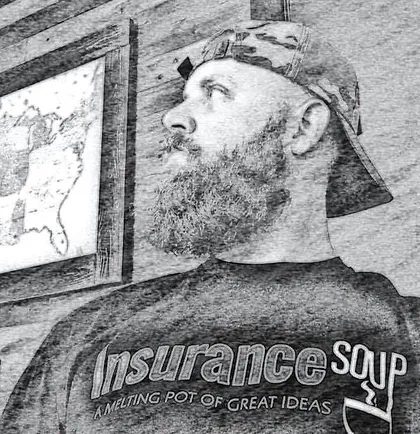Let’s get right into it, because you’ve been there. We all have.
You’re deep in a conversation with a client—laying out the risks, the exposures, the solutions—showing them exactly how a certain policy or level of coverage protects their family, their business, or their assets. You’re rolling. You’re in the zone.
And then, out of nowhere…
“Yeah, but my brother-in-law says I don’t need that.”
Insert internal eye roll.
Suddenly, you’re no longer the licensed, trained, experienced advisor sitting across the table (or on the Zoom). Now you’re just another insurance person “trying to sell something,” while Cousin Kevin—who works construction and watches TikToks about finance—is the new voice of reason.
So… what do you do?
Do you argue? Do you back down? Do you shrug and move on?
Nah. You handle it. Professionally. Patiently. And with a little finesse that lets you keep your authority intact without going full “well actually...” on them.
Let’s talk about how.
1. Validate First—Even If It’s Absurd
I know this part feels like swallowing nails, but stick with me. The first step is to validate their concern, not dismiss it.
If someone says their cousin told them they don’t need life insurance until they’re 40 (and they’re 31 with two kids), instead of saying, “Your cousin’s an idiot,” try:
“Totally fair to want to compare advice—especially from someone you know and trust. A lot of people share ideas about insurance based on their own experience or what they’ve heard, and sometimes there’s a nugget of truth in it. But it’s important to remember, what’s right for them might not fit your situation at all.”
This response acknowledges their source of trust while still positioning you as the expert. It doesn’t create resistance—it creates curiosity. That’s your entry point.
2. Put the Ball Back in Their Court—Gently
If they’re parroting bad advice, use questions to walk them into the problem instead of forcing them there.
Let’s say a client tells you their friend said umbrella insurance is a waste. You respond with:
“Interesting. Out of curiosity, do you know what kind of coverage limits your friend carries? Or how many rental properties they have?”
Silence.
“See, in your case, with a teenage driver, a boat, and a second property you rent out, you’ve got layers of risk. That’s where umbrella policies shine. But if your friend doesn’t have any of that, they may not need one—so I can understand why they’d think that.”
Now you’ve flipped it. You’ve subtly discredited the “friend,” not by saying they’re wrong, but by showing they’re not relevant.
3. Call Out the Elephant in the Room—With Class
Sometimes you’ve got to say what they’re thinking before it poisons the conversation.
“Look, I get it. Insurance agents have a bad rap. People assume we’re just here to upsell and pad commissions. And yeah, unfortunately there are some out there who operate that way. But let me be clear—I’m not in this business to sell you something you don’t need. I’m here to make sure you don’t come back to me three years from now angry that no one warned you. That’s what I care about.”
Boom. Now you’ve taken their suspicion and neutralized it by acknowledging it before they even say it. And in the process, you positioned yourself as the rare professional who’s focused on protecting—not just selling.
4. Use Real Stories to Undermine Bad Advice
Data is great. But stories convert.
When someone hits you with “My friend said I don’t need that much coverage,” instead of going back to your quoting software and rattling off stats, pull out a story:
“Totally understand. I had a client last year with almost the exact same coverage setup we’re discussing. They decided to cut back on their liability to save $8 a month. Four months later—rear-ended a cyclist. Hospital bills hit six figures. Their policy capped out way too early. They’ve still got a lien on their wages.”
Pause.
“That’s why I bring it up. Not because I want you to buy more… but because I don’t want you to wish you had.”
Suddenly, the “extra coverage” isn’t some upsell—it’s the difference between disaster and peace of mind.
5. Make the Math Make Sense
People love advice that sounds simple. “You don’t need that” is way easier to digest than “Let’s assess your actual exposure based on asset risk and loss limits.” But you know what breaks through that simplicity?
Clear, human-level math.
Let’s say they’re balking at adding renters insurance or additional coverage on valuables. Hit them with:
“It’s $18 a month. That’s less than a dollar a day. You’re telling me your brother-in-law wouldn’t protect $40,000 worth of stuff for 60 cents a day? You sure he’s the one you want steering this ship?”
Smile. Keep it light. But make the math hit. When people see the true cost vs. consequence, that “friendly advice” starts to lose weight.
6. Remind Them What You Actually Do
You’re not a walking price sheet. You’re not here to shove policies in someone’s face. You are a risk manager, a guide, a translator between legalese and reality.
Sometimes you’ve got to spell that out.
“I’m not just here to sell you a policy. My job is to help you understand where the cracks in the floor are before you fall through them. I’ve seen what happens when people take shortcuts or listen to the wrong advice. I’d rather have a tough conversation now than watch you lose everything later.”
When you show that you take their outcome personally, not just their premium, you earn trust fast.
Final Word: You’re the Professional—Act Like It
Look, you’re not going to win every one of these battles. Some people are married to their cousin’s bad advice, and you’re not in the business of dragging people over the finish line.
But you are in the business of being a pro. That means keeping your cool, keeping your authority, and knowing how to redirect the conversation when someone starts quoting “Facebook Finance 101.”
Hold the line. Be the calm, educated voice in a sea of noise. And always remember—when that advice from Cousin Kevin fails, guess who they’ll call?
You.
Just make sure you're still standing there, not saying “I told you so”… but quietly thinking it anyway.
.png?width=180&height=65&name=Untitled%20design%20(29).png)




